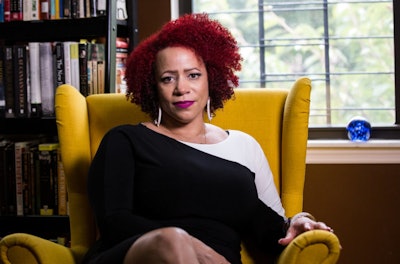Nikole Hannah-Jones is taking her talents to Howard University — and she’s taking Howard alumnus Ta-Nehisi Coates with her.
Thanks to nearly $20 million in donations from the Knight Foundation, the Ford Foundation, the John D. and Catherine T. MacArthur Foundation and an anonymous donor, Pulitzer Prize winner Hannah-Jones will join the Cathy Hughes School of Communications as a tenured member of the faculty beginning this summer.
Hannah-Jones will be the inaugural Knight Chair in Race and Journalism and will found the Center for Journalism and Democracy. Coates will join the faculty of the College of Arts and Sciences as the Sterling Brown Chair in the Department of English.
 Nikole Hannah-Jones
Nikole Hannah-JonesThe news comes after Hannah-Jones recently turned down a much-delayed and controversial tenure offer at her alma mater, the University of North Carolina, following an initial denial of tenure in January because of her work on the 1619 project. Some donors and board members at UNC initially expressed expressed concerns over Hannah-Jones’ work on the 1619 Project — which details the lasting impacts of slavery on Black Americans today — which has been a target of conservatives in their fight against critical race theory. After months of student and public protests, letters to the institution and public pressure, the UNC Board of Trustees voted this week to extend tenure to Hannah-Jones.
But she announced in a statement Tuesday that she would not be accepting the offer.
“Why would I want to teach at a university whose top leadership chose to remain silent, to refuse transparency, to fail to publicly advocate that I be treated like every other Knight Chair before me? Or for a university overseen by a board that would so callously put politics over what is best for the university that we all love? These times demand courage, and those who have held the most power in this situation have exhibited the least of it,” said Hannah-Jones in a statement released Tuesday through the NAACP Legal Defense Fund.
“The Board of Trustees wanted to send a message to me and others like me, and it did. … Since the second grade when I began being bused into white schools, I have been fighting against people who did not think a Black girl like me belonged, people who tried to control what I did, how I spoke, how I looked, the work I produced.”
Hannah-Jones says joining the faculty at Howard “fulfills a dream I have long carried,” and she hopes “that the decision Ta-Nehisi and I made to bring our talents to an HBCU (historically Black colleges and universities) will lead others to make a similar choice.”
For Coates, the decision is personal.
“This is the faculty that molded me,” he said. “This is the faculty that strengthened me. Personally, I can think of no greater honor than this.”
The Center for Journalism and Democracy hopes to work with other HBCUs that have journalism programs to strengthen the pool of Black journalists across the country.
“At such a critical time for race relations in our country, it is vital that we understand the role of journalism in steering our national conversation and social progress,” said Dr. Wayne A.I. Frederick, Howard University president. “Not only must our newsrooms reflect the communities where they are reporting, but we need to infuse the profession with diverse talent.”
![faculty-salary[1547520018]](https://img.diverseeducation.com/files/base/diverse/all/image/2021/04/edu.faculty-salary1547520018-e1618425046370.png?auto=format%2Ccompress&fit=crop&h=100&q=70&w=100)
















